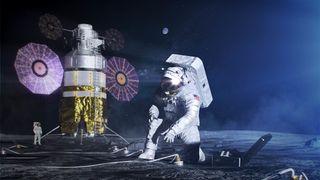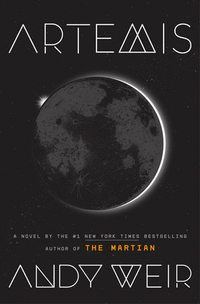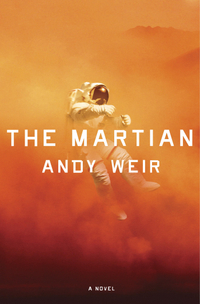Sci-fi author Andy Weir says NASA didn't name 'Artemis' moon program after his book

Andy Weir, the best-selling author of "The Martian" and "Artemis," was just as surprised as the rest of us when NASA gave its new crewed moon landing program a familiar name: "Artemis."
Weir found himself fielding a lot of puzzled queries from friends and families after NASA announced the program's name in May 2019, about 18 months after Weir's novel was published.
"It turns out that Apollo had a twin sister, Artemis. She happens to be the goddess of the moon," NASA Administrator Jim Bridenstine said, referring to Greek mythology, in a discussion with reporters at the time. "Our astronaut office is very diverse and highly qualified. I think it is very beautiful that 50 years after Apollo, the Artemis program will carry the next man — and the first woman — to the moon."
Related: NASA graduates new class of astronauts to join Artemis-era missions
Artemis: A Novel (Crown, 2017) by Andy Weir | $7 on Amazon
Science fiction author Andy Weir envisions what life is like on the moon base Artemis in his follow-up novel to "The Martian."
However, Weir told Space.com, NASA's program is not a reference to his fictional moon city "Artemis," (Crown Publishing, 2017), which is set in the 2080s and discusses matters such as commercial space ventures, space tourism and space smugglers.
"It was pretty cool; it was pretty funny," Weir said. "But they didn't name it after my book. It was just pure coincidence." Weir added that Artemis is a natural name not only because she is the sister of Apollo, but as a goddess, one of her responsibilities was the moon.
The Trump administration tasked NASA with landing astronauts on the moon by 2024 in preparation for crewed missions to Mars in the mid-2030s. NASA aims to launch an uncrewed test mission called Artemis I in late 2020 or early 2021, during which an Orion spacecraft loops around the moon and returns to Earth. Crewed Artemis missions will follow later in the program.
Get the Space.com Newsletter
Breaking space news, the latest updates on rocket launches, skywatching events and more!

Weir said he wasn't sure if NASA could meet the 2024 deadline, or if these planned moon landings will happen. "I hope so, but we'll see," he said. "The problem with U.S. space policy is it's so heavily influenced from administration to administration … you can't do a major space program in four to eight years."
He added that each president is eager to define their own space policy but, by doing so, "NASA gets whiplash." Since 2000, for example, George W. Bush had a program to send crewed missions to the moon and Mars, Barack Obama canceled that in favor of a "flexible destination" program that could include asteroid missions and Donald Trump canceled Obama's asteroid plans in favor of a new moon program with possible Mars landings.
'The Martian' Audiobook | Audible, Free with Audible Trial
Author Andy Weir's science fiction hit "The Martian" about an astronaut stranded on Mars is now an audiobook from Audible narrated by actor Wil Wheaton of "Star Trek: The Next Generation," "Big Bang Theory," and more. You can get it free with an Audible trial or download with one-click from Amazon for $30.58.
In 2019, NASA also paid tribute to the 50th anniversary of the Apollo 11 moon landing, the first such venture by humans. Weir said that he didn't closely follow the anniversary programming — "they did a lot of stuff" — but added that he is a "huge fan" of the Apollo program, which sent 12 people to the moon's surface between 1969 and 1972.
"I've never been too motivated by pomp and circumstance and ceremony, but it was an amazing accomplishment and we people, as a planet, are proud of it," he said.
- What It's Like to Become a NASA Astronaut: 10 Surprising Facts
- Check Out NASA's New Artemis-Generation Spacesuits (Video)
- Who Will Be the First Woman on the Moon?
Follow Elizabeth Howell on Twitter @howellspace. Follow us on Twitter @Spacedotcom and on Facebook.

Join our Space Forums to keep talking space on the latest missions, night sky and more! And if you have a news tip, correction or comment, let us know at: community@space.com.

Elizabeth Howell (she/her), Ph.D., is a staff writer in the spaceflight channel since 2022 covering diversity, education and gaming as well. She was contributing writer for Space.com for 10 years before joining full-time. Elizabeth's reporting includes multiple exclusives with the White House and Office of the Vice-President of the United States, an exclusive conversation with aspiring space tourist (and NSYNC bassist) Lance Bass, speaking several times with the International Space Station, witnessing five human spaceflight launches on two continents, flying parabolic, working inside a spacesuit, and participating in a simulated Mars mission. Her latest book, "Why Am I Taller?", is co-written with astronaut Dave Williams. Elizabeth holds a Ph.D. and M.Sc. in Space Studies from the University of North Dakota, a Bachelor of Journalism from Canada's Carleton University and a Bachelor of History from Canada's Athabasca University. Elizabeth is also a post-secondary instructor in communications and science at several institutions since 2015; her experience includes developing and teaching an astronomy course at Canada's Algonquin College (with Indigenous content as well) to more than 1,000 students since 2020. Elizabeth first got interested in space after watching the movie Apollo 13 in 1996, and still wants to be an astronaut someday. Mastodon: https://qoto.org/@howellspace
-
heinlein Artemis is the Greek goddess of the hunt; equivalent to the Latin Diana. Since many astronomical objects are named after Greek dieties, it is no surprise that NASA chose one for this program.Reply


